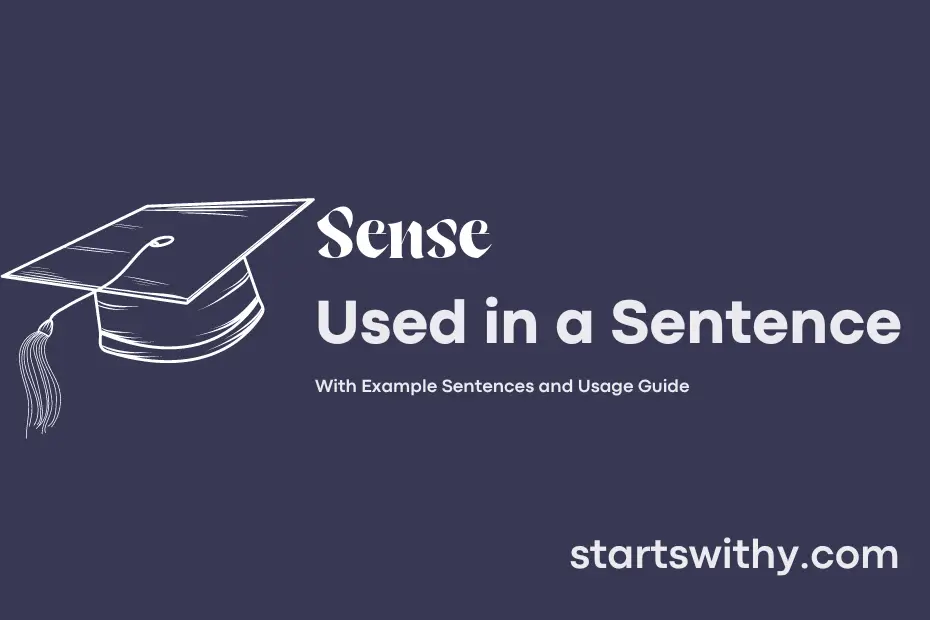Have you ever wondered how to use the word “sense” correctly in a sentence? “Sense” can be a noun or a verb that relates to perception or understanding, giving our language depth and nuance.
When used as a noun, “sense” refers to one of the five faculties of perception—touch, taste, sight, smell, or hearing—as well as to understanding or meaning. As a verb, “sense” pertains to detecting or grasping something through physical or intuitive means.
7 Examples Of Sense Used In a Sentence For Kids
- Use your sense of touch to feel the soft toy.
- Close your eyes and use your sense of smell to guess the flower.
- Look at the colorful picture and use your sense of sight to find the rainbow.
- Can you hear the birds chirping? Use your sense of hearing to listen carefully.
- Use your sense of taste to identify the sweet candy.
- The soft blanket feels cozy when you use your sense of touch.
- Use your sense of sight to count the stars in the night sky.
14 Sentences with Sense Examples
- Sense of time management is essential for college students to meet deadlines.
- It is important to pay attention to your sense of direction when navigating a new campus.
- Maintaining a balanced diet can improve your sense of well-being during exams.
- Developing a good sense of organization can help you keep track of study materials.
- Participating in extracurricular activities can enhance your sense of teamwork.
- Building a strong sense of community within your college can lead to more connections.
- Cultivating a sense of curiosity can motivate you to explore new academic interests.
- Using online resources can enhance your sense of self-learning and independence.
- Collaborating with classmates can improve your sense of collaboration and communication.
- Joining a study group can help you gain a better sense of understanding complex topics.
- Developing a sense of resilience can help you bounce back from academic setbacks.
- Engaging in mindfulness practices can heighten your sense of focus during lectures.
- Seeking help from professors can clarify doubts and improve your sense of comprehension.
- Graduating with honors can boost your sense of accomplishment and pride.
How To Use Sense in Sentences?
To use the word “Sense” in a sentence, start by understanding its meaning and different contexts it can be used in. The word “Sense” is a noun that refers to one’s ability to perceive and understand a situation or feeling. It can also mean a feeling based on intuition rather than facts.
Here are a few examples of how to use “Sense” in a sentence:
- “She had a strange sense of déjà vu when she entered the room.”
- “His sixth sense told him that something was wrong.”
- “I have a sense of accomplishment after finishing the project.”
- “Common sense dictates that you should look both ways before crossing the street.”
- “She had a keen sense of style and always dressed impeccably.”
When constructing a sentence with the word “Sense,” consider the context and meaning you want to convey. It can be used to describe a physical sensation, an intuitive feeling, or even a logical understanding of a situation. Experiment with different sentence structures to see how the word “Sense” fits best in your writing.
By practicing and incorporating Sense in various sentences, you will become more comfortable using it correctly in your everyday communication. Don’t be afraid to experiment and explore different ways of using the word “Sense” to enhance your language skills.
Conclusion
In writing, sentences with sense are essential for conveying information clearly and effectively. Crafting sentences that make sense involves ensuring proper grammar, structure, and coherence to avoid confusion and misunderstanding. By constructing sentences with sense, writers can communicate their ideas in a logical and cohesive manner, enhancing the overall quality and readability of their content.
Whether in academic papers, professional emails, or casual communication, the ability to form sentences with sense is fundamental to effective communication. By thoughtfully organizing thoughts and ideas into coherent sentences, writers can engage their audience, convey their message accurately, and leave a lasting impact. Therefore, mastering the art of crafting sentences with sense is vital for any individual looking to express themselves effectively in various contexts.



